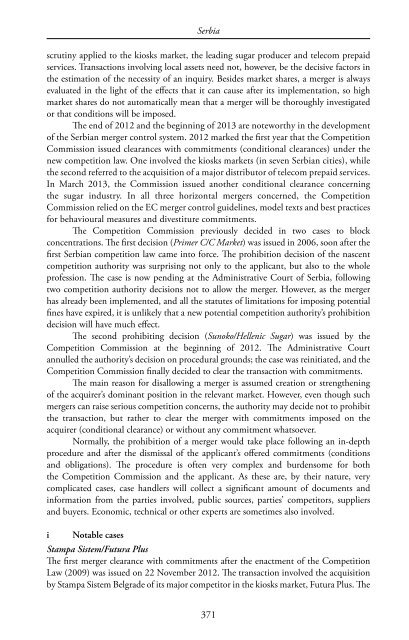Serbia - Karanovic & Nikolic
Serbia - Karanovic & Nikolic
Serbia - Karanovic & Nikolic
You also want an ePaper? Increase the reach of your titles
YUMPU automatically turns print PDFs into web optimized ePapers that Google loves.
<strong>Serbia</strong>scrutiny applied to the kiosks market, the leading sugar producer and telecom prepaidservices. Transactions involving local assets need not, however, be the decisive factors inthe estimation of the necessity of an inquiry. Besides market shares, a merger is alwaysevaluated in the light of the effects that it can cause after its implementation, so highmarket shares do not automatically mean that a merger will be thoroughly investigatedor that conditions will be imposed.The end of 2012 and the beginning of 2013 are noteworthy in the developmentof the <strong>Serbia</strong>n merger control system. 2012 marked the first year that the CompetitionCommission issued clearances with commitments (conditional clearances) under thenew competition law. One involved the kiosks markets (in seven <strong>Serbia</strong>n cities), whilethe second referred to the acquisition of a major distributor of telecom prepaid services.In March 2013, the Commission issued another conditional clearance concerningthe sugar industry. In all three horizontal mergers concerned, the CompetitionCommission relied on the EC merger control guidelines, model texts and best practicesfor behavioural measures and divestiture commitments.The Competition Commission previously decided in two cases to blockconcentrations. The first decision (Primer C/C Market) was issued in 2006, soon after thefirst <strong>Serbia</strong>n competition law came into force. The prohibition decision of the nascentcompetition authority was surprising not only to the applicant, but also to the wholeprofession. The case is now pending at the Administrative Court of <strong>Serbia</strong>, followingtwo competition authority decisions not to allow the merger. However, as the mergerhas already been implemented, and all the statutes of limitations for imposing potentialfines have expired, it is unlikely that a new potential competition authority’s prohibitiondecision will have much effect.The second prohibiting decision (Sunoko/Hellenic Sugar) was issued by theCompetition Commission at the beginning of 2012. The Administrative Courtannulled the authority’s decision on procedural grounds; the case was reinitiated, and theCompetition Commission finally decided to clear the transaction with commitments.The main reason for disallowing a merger is assumed creation or strengtheningof the acquirer’s dominant position in the relevant market. However, even though suchmergers can raise serious competition concerns, the authority may decide not to prohibitthe transaction, but rather to clear the merger with commitments imposed on theacquirer (conditional clearance) or without any commitment whatsoever.Normally, the prohibition of a merger would take place following an in-depthprocedure and after the dismissal of the applicant’s offered commitments (conditionsand obligations). The procedure is often very complex and burdensome for boththe Competition Commission and the applicant. As these are, by their nature, verycomplicated cases, case handlers will collect a significant amount of documents andinformation from the parties involved, public sources, parties’ competitors, suppliersand buyers. Economic, technical or other experts are sometimes also involved.i Notable casesStampa Sistem/Futura PlusThe first merger clearance with commitments after the enactment of the CompetitionLaw (2009) was issued on 22 November 2012. The transaction involved the acquisitionby Stampa Sistem Belgrade of its major competitor in the kiosks market, Futura Plus. The371













